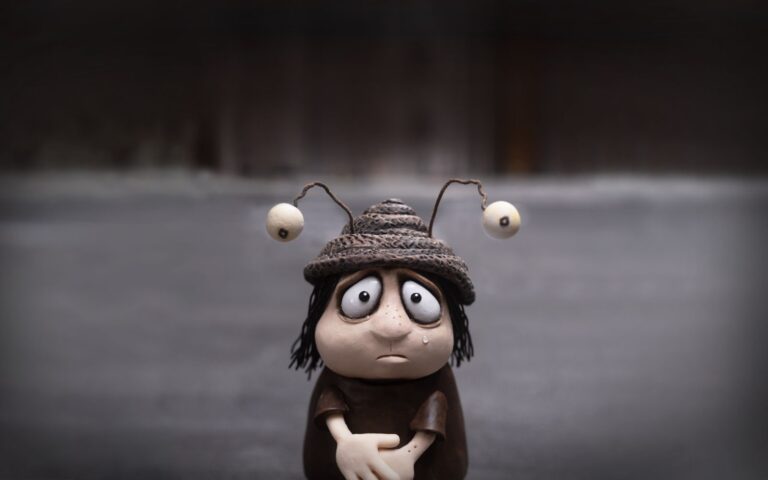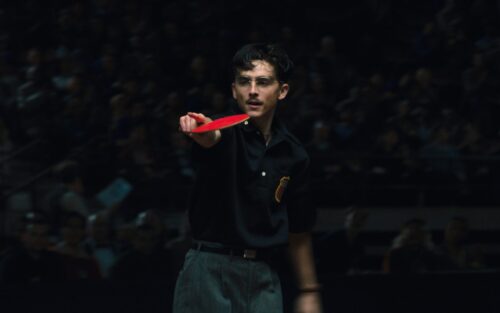
Memoir of A Snail: Inside Adam Elliot’s Stop-Motion Masterpiece
Drawing from personal experiences, the Oscar-winning animator crafts an emotional narrative that pairs outlandish humour with profound sadness.
by Prabhjot Bains
- Published on
Many films, to varying degrees of success, attempt to measure the philosophical weight of existence, instilling a tragic understanding and appreciation of the human experience in their audience. It’s an exercise defined by auteur-driven, live-action fare but Adam Elliott’s stop-motion animated Memoir of a Snail exists as a delicate and infinitely rewarding challenge to that assertion. Teeming with pathos and humility, Elliott’s film molds a beautifully Kierkegaardian mediation on trauma, grief, and how difficult it is to recognize the cages we create for ourselves when grappling with them.
Set in 1970s Australia, Memoir of a Snail centres on Grace Pudel (Sarah Snook) and her life of many tragedies. After being born with a cleft lip and later separated from her twin brother, Gilbert (Kodi Smit-McPhee), Grace settles into a lonely and closeted existence—defined by an incessant need to hoard snails, romance novels, and guinea Pigs to fill the void in her life. The only solace she finds is in the letters penned by her brother, who lives in the opposite end of the country with a religiously strict family, and her elderly and zestful friend Pinky (Jacki Weaver), who slowly helps her pick up the pieces of her life.
While on the surface, this reads as a story that doesn’t necessarily lend itself to animation, the sheer thematic depth of each meticulously hand-crafted frame quickly burrows into the soul. That level of pure and complete control draws Elliott to the medium. “The beauty of animation, and stop-motion in particular, is that it’s such a wonderful medium to tell any story you like,” Elliott tells RANGE. “I’ve never seen animation as a genre, there’s no reason you can’t deal with challenging subject matter.” He notes animators have this “wonderful tool of exaggeration, we can create any world we want, our characters can look however we want, and we get to play god and be megalomaniacs.”
With that sense of freedom, Elliott not only believes any story can be conveyed with animation, but the form can actively empower them, rendering them much more resonant and personal. “I want my films to be nourishing, uplifting, and soulful,” he says. And the fact that “they are very dense films, and I cram a lot in” allows for that effect. With highly intricate and detailed strokes, Elliot wants audiences to bask in the enduring melancholy of his story. “I’m very cruel to my protagonists; I drag them through the mud and inflict a lot of trauma and suffering on them,” he says. “But I try to reward them and my audience, I always say, if you’re not an emotional wreck by the end of one of my films, then I’ve failed.”
Memoir of a Snail is the type of rare cinematic experience that feels vividly animated from hard-fought and hard-won life experiences. “All my characters are extensions of myself,” Elliott notes. “And I think what links them is loneliness, melancholy, solitude, and feeling like you’re a misfit and misunderstood. He continues, “loneliness is something all people experience at some point in their lives, it’s part of the human condition and it’s quite healthy to be lonely at times and feel sorry for ourselves.” In wrestling with these feelings, Elliott attempts to create characters that are very relatable. He notes, “even if they’re blobs of clay, I’m trying to get the audience to believe they have a soul, heartbeat, and that they’re real because authenticity is what I’m after.”
That feeling is something Memoir of a Snail wholeheartedly captures, especially because Elliot reveals all his characters are based on real people in his life. “Grace is based on my mother and a friend of mine who was born with a cleft palate. She had a very traumatic childhood, she was teased and bullied a lot.” Elliott continues, “I have friends who have gone through conversion therapy, often inflicted by their own parents.”

In exploring the dark spheres of alcoholism, toxic fetishism, and religious fanaticism through vivid animation, Memoir of a Snail taps into a rich vein of deeply personal and emotional truths we often neglect. However, Elliott’s fountain of inspiration isn’t all dour. He notes Pinky — the film’s funniest and most fascinating character — “is based on a friend of mine that did once play ping pong with Fidel Castro…. Though, she didn’t have sex with John Denver in an airplane,” as she does in the film. Characters like Pinky are key to the impactful line Memoir of a Snail walks between outlandish comedy and genuine tragedy.
Yet, what allows these characters to retain such staying power are the lived-in voice performances that bring them to life. In casting his films, Elliot searches not for exaggeration but authenticity. “Nine times out of 10, an actor wants to do a voice, and I tell them I don’t even want them to act, just be themselves.” He notes, “sometimes you get a big-name actor, and it just doesn’t work” because “it’s not a cartoon but a hopefully serious piece of cinema.”
“I watch movies with my eyes closed and try to imagine if they can inhabit a blob of clay,” Elliot says, which is why “Sarah Snook was an early choice” as were fellow Aussies Eric Bana and Kodi Smit-McPhee. In his search for honesty, francophone Dominique Pinon was an immediate choice to voice Grace’s French father Percy. Though Elliott isn’t above the odd cameo, having singer-songwriter Nick Cave join the film as a “last-minute choice.” Though, Elliott notes it’s “the animators who are the real actors and the ones who make the film shine.”
Down to each curve and nick of clay, Memoir of a Snail is a film that uses the animated medium to its full potential, shying away from all labels to impart deep felt life lessons to its adult audience. Both incredibly funny and deeply sad, it repeatedly makes us stop dead in our tracks, smell the air, and embrace the bittersweet fact that mirrors a powerful reflection of Elliot’s: “Life can only be understood backwards, but we have to live it forwards.”
Memoir of a Snail is in theatres nationwide on Nov. 22
By Glenn Alderson
A deep-listening session reveals how Apple Music’s sonic innovation reshapes the way we hear.
By Cam Delisle
Dominic Weintraub and Hugo Williams take audiences on a treadmill-fueled ride through the chaos and hope of modern life.
















